In October of last year, I was feeling wobbly and out of sorts. I had actually been feeling that way for longer, but it’s difficult to quantify how long and any estimation wouldn’t be a sufficient measure. I had been doing stand-up just over a year and was starting to feel like I was hitting a wall. I felt like, even in my funniest moments, I was still trying to act pretty.
Acting pretty is its own distinct project, separate from though closely linked to looking pretty. Most American women aspire to accomplish both, because under capitalism, this is a woman’s moral responsibility. Women who cannot look and act pretty are considered moral failures—women who have done something wrong; women who have failed at being women. Aside from looking beautiful, we are expected to be proper, sunny, reserved, palatable, adorable. Prettiness is a project my mother made sure I had a head start on. It’s very important to her that I act pretty, talk pretty, look pretty, feel pretty, laugh pretty, make pretty, et cetera. I can’t tell you how important it is. I have seen her eyes absorb with terror as she turns over the possibility that her daughter be ugly in some way. It’s something she refuses to accept.
I knew that acting pretty was limiting me creatively, comedically, and personally, but I didn’t know how to stop it. When you act one way for twenty-five years, it’s hard to just shake it off. I needed a contained space to experiment, to be silly, to roam free of convention. A space where I could yodel, or howl, or short-circuit like a wet hairdryer. I needed a place where I could be weird. And no, not an improv class. Weirder. Much. Weirder.
Because if, under capitalism, the opposite of looking pretty is, I guess, looking ugly, then the opposite of acting pretty is acting weird.
I took to my instagram story for answers.
i want to take a Get Weird class where we practice getting weird. one hour a week, that’s all i need.
The comments came flooding in:
Take clown class.
That’s how I ended up in Tallie Medel’s Clown Level 1: Intro to Clown at the Brooklyn Comedy Collective, albeit seven months later. It took me a while to figure out what clown class was, where you’re supposed to learn it, and how much money you’re supposed to spend on it.
I had heard about the clown class at BCC from MC Nanda, who is about as cool and mystifying as any person can be. Anything she says I imbibe as scripture. It was just… freeing, she ruled. I was as excited to start clown class as I was to start college.
But even with hundreds of dollars down the drain and an impending start-date on the books, I still didn’t know what “clown” was. I had a vague idea—physical comedy, exaggeration of character—but what that meant in practice remained a black box. I assumed, like most jobs, you just learn by doing.
On May 11th, I documented my journey with a post:
Clown 1: Intro to Clown met from 12-3 every Saturday for seven weeks. I missed the first week to attend my brother’s college graduation and arrived at class #2 with an unfurled anxiety that I had missed all the clown fundamentals surely covered in class #1.
I introduced myself to the teacher, Tallie, whom I already feared, having been cautioned by a friend that the highest clown instructors in France are altogether cruel, supercilious and unforgiving creatures. I was also afraid of Tallie because I grew up a ballet dancer, and ballet dancers dread telling their instructors what I needed to tell Tallie—that I have an injury. Well, not so much an injury as it is an autoimmune chronic pain disorder, but it makes no difference in ballet. I had to warn Tallie that sometimes I need to sit down and it’s not because I don’t respect everything she’s doing with her clown class. Tallie, who accepts all pronouns, was warm and understanding and told me about a friend of theirs who had a similar condition. In ballet, your feet could be blistered and bleeding and broken and you still would not dare tell your teacher that you are hurt. Pain is a big part of ballet. One day, I will write an essay where I try to make sense of why my fifteen-year-old body was treated with such tyrannical disregard, but that day isn’t today. With Tallie, I felt safe, and that was both new and nice.
Something I had missed in class #1 is that Tallie played Joy’s girlfriend, Becky, in the Oscar-winning film, Everything Everywhere All At Once. Tallie had referenced their work on the film a few times, but in a manner so humble I assumed they had been hired as the clown choreographer for the hot-dog-finger battle scenes (which is a noble and awesome job, just not the same as knowing they acted in one of our decade’s most critically vaunted films). It’s not every day you are bestowed with a celebrity clown teacher, especially one who looks so effortless in hot dog fingers.
At this point it was time to figure out what the hell clown was about.
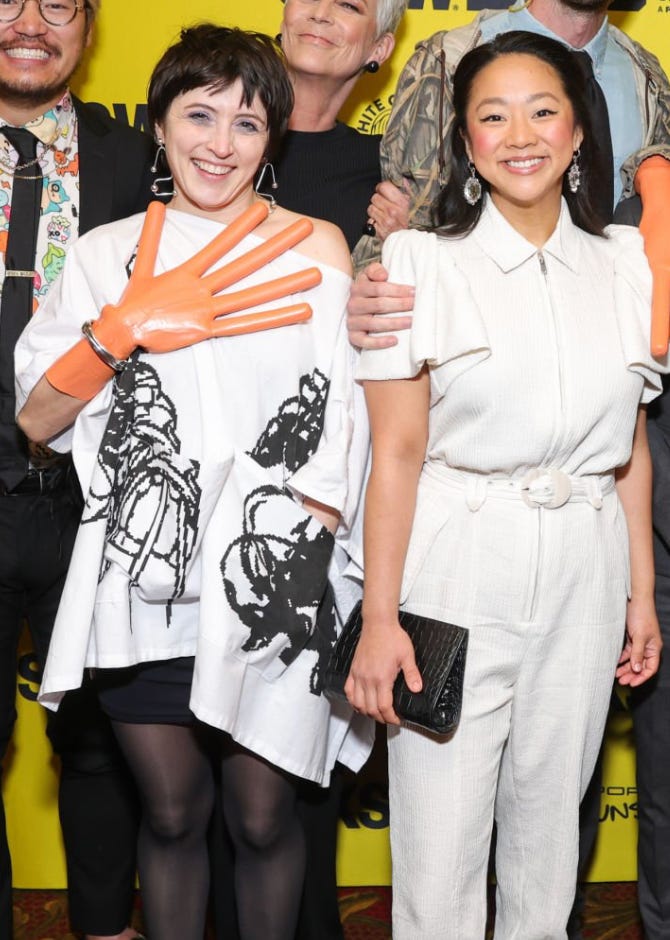
No one wants to admit this, or perhaps I’m the first specimen to unite the Venn diagram, but clown class is a lot like SoulCycle. You warm up, do a bunch of exercises, take a break, then regroup for a Big Finale.
Each Saturday began in a seated circle. At first, this was so Tallie could collect attendance and learn our names. She would look at a person, holding eye contact for a stretched, awkward amount of time and say,
What’s your name?
To which the person would say something like:
Jack
And then Tallie would hold that stare, a look containing some mess of seriousness, perplexity and awe. After a few measured moments, she would glance down at a blank sheet of notebook paper and say,
Hmm, yes, looks like that’s correct. Good job.
I gleaned the first lesson: Clown is about staring.
In later weeks, we used the starting circle to play Rose, Thorn, Soil—a mindfulness exercise where each person shares something good from their week (the Rose), something bad (the Thorn), and something they’re looking forward to (the Soil). When fellow clowns shared their good fortunes, no matter how small, we applauded and shouted YAYYYY!!! Tallie clarified that the yay-ing isn’t traditional clown conduct but rather a sign of my class’s unique and invigorating level of support for one another. (Imagine touting I found my missing AirPod to an applause circle of sixteen grown adults sitting criss-cross applesauce. If you succumb to the stupidity of it, you might start to feel better about the world).
After this, we would perform a series of stretches while making amorphous noises from different parts of our mouths. Words like Paeeeeeee and FUH and Blblbl!, among some other good ones. Clown is about noise, not words. This was essential to the start of class and helped us acclimatize to play and nonsense. Clown is most certainly about play and nonsense.
To learn each other’s names, we played what I can only describe as the clown version of zip zap zop. To play the game, you stand in a tight circle. Person 1 starts the game by slapping the back of either person standing directly next to them. The person who gets slapped, Person 2, then shouts the name of someone else in the circle. The person whose name was called, Person 3, will slap the back of someone standing directly next to them and the cycle continues.
When I say slap, I do mean with force. At the start of the game, you practice hitting the two people next to you to gauge their tolerance. Tallie instructed that it was important to give a good whack, because pain is funny in clown. Clown is about being funny, but unlike ballet, clown is not about pain. It’s about a clown’s reaction to pain, which can, most of the time, be funny.
In any game, there are winners. You are eliminated if you hesitate too long, shout when you should have slapped, slap when you should have shouted, or say the name of a person who is no longer in the circle. I kept being eliminated for making a fifth mistake: When the person next to me slapped my back, I would promptly shout out my own name: SHELBY.
The night of my first class, I told my friends that clown was a lot kinkier than I expected it to be.
Clown is mostly about hitting!
Most games involved a handful of clowns on stage while the rest of us watched. Clown is about the Publique—the divide and fluidity between the clown and the audience. Clown is about figuring out what your Publique likes and making more of it. If your Publique doesn’t like something, it’s best to try one more time and then stop doing it.
As Clown Boss, Tallie’s job was to sew between the clowns and the Publique. To forge connectivity. One week, she asked us to bring in a prop.
Bring whatever you think your crutch is.
I knew what that meant. A crutch is something we hide behind. Mine is my hair. It’s bleach blonde and, because of my hair extensions, almost always looks good (sorry). I tied it up beneath a beanie. Clown is about eliminating your security blanket.
When it came time to curate clown costumes for our final show, we were instructed to choose an outfit that exaggerated a visible piece of ourselves—to play with the way we are already perceived. Clown is about leaning into perception. We took a trip to the BCC costume closet and I watched as my classmates tried on lab coats, bald caps, and banana suits. Nothing felt right. Nothing felt like me. Then I saw this blonde nest, tangled and unkempt, sunk deep in the wig bin. As a joke, I put it on.
Oh, yes. That’s it. That’s clown. Tallie said.
I was surprised. Here I had come to break free of being blonde (literally & metaphorically), only to find out that it’s what makes me clown? CharliXCX, can you riddle me that?
I crowned my fake blonde hair with more fake blonde hair and Tallie was right. It felt clown.
The wig inevitably flew off during the show—an opportunity to mimic the eruptive panic of a man who lost his toupee to the wind. Naked! But not afraid :)
Of my classmates, I shared a particular affinity with a clown named Oleg. Oleg was anywhere between 34 and 45 years old and looked like the adult embodiment of the kid with a severe peanut allergy in elementary school—his face dominated by a prominent forehead, small eyes, and Harry Potter-style glasses that sat below a somewhat kismet forehead scar. I mean this all in a kind way. I only mean for anything I say about Oleg to be kind. His voice chimed in a flimsy nasal tenor and his general disposition was cloaked by a deadpan bluntness that wrapped us in this delightful unease. He never sugarcoated anything and was oblivious to the effect of his words on others. This made everything he said hilarious. When we took turns sharing our roses for the week, Oleg announced that his rose was “getting promoted and making insane bank at [his] job.” It turned out that, aside from being a clown and a regular improviser at Magnet Theater, Oleg was also a VP at Morgan Stanley.
Oleg and I were paired for a coaching game where he played a Clown Director instructing me, the Clown Actor, through five emotions: Anger, Sadness, Fear, Happiness and Lust. As I danced between characters, a fervent Oleg spat critique like a Russian ballet master.
You think that’s sadness? I wouldn’t even believe that your pet bird died of natural causes! Show me real sadness. SADDER! Sink into the floor. No!!! I can still see your body! Sink into the floor! Make your elbows look DEPRESSED!
Tallie caught wind of Oleg’s directorial prowess and told us we needed to incorporate the exercise into our clown show at the end of the term. Oleg’s clown directing was so good it needed to be brought to the Publique.
In June, Augusta and I threw a comedy show for my birthday and I sent the ticket link in my class WhatsApp. I arrived at Club Cumming to find Oleg, sitting in the audience. He was by himself. He came just to see me. I handed him a miniature party hat. I don’t have a picture.
There was something Tallie repeated each class without fail.
Clown is antifascist.
It’s a loaded thing to say. Fascism is a word with real density. It’s one of the heaviest words we have. But I have no doubt it’s true.
Fascism is the opposite of clown: authoritarianism, conformity, oppression. Clowns make fun of rules, mock authority, and celebrate their inner freak. Clown is about resistance. Clown is about radical self-acceptance. Maybe that’s why Kamala Harris can laugh and why Trump has chosen this shore to anchor his misogyny (I’m not a Kamapologist, but we can point this one thing out kk).
Clown is about peeling off and velcroing your inner child onto the adult world and letting them roam free. Tallie once said:
As clowns, we wear our ugly parts proud on our chests. I never stop talking! And that’s okay. I can be a clown who never stops talking! I don’t need to be ashamed of that here.
I signed up for clown class to discover what it could feel like if I stopped acting pretty and started acting…idk…normal? I’m not equating this motive with the clown’s quest of antifascism, but I did come to clown class seeking political escape. And for a few brief moments, I found it.
How to take this back to my regular, non-clown life, I’m not sure. I probably need a few more clown classes to figure that out. When you act one way for twenty-five twenty-six years (I had a birthday), it’s hard to let it all go right away.
Tallie told us that there isn’t a good definition of clown, but the best they’ve heard so far is this:
The clown is the fool dancing with the world.
I often feel like the girl, looking at the fool, pining to dance alongside him and not knowing quite how.
I look forward to sorting it out over time.
If you take a clown class, do let me know!
Xoxo,
Shelby
Back-word
It’s becoming habit that I move my foreword to the end. I wanted to take a moment to say, well, hello! I know it’s been a while. The shortest and truest answer for my absence is that I was in a relationship. I’ve also been working on other things—namely writing (and rewriting and rewriting) a pilot—but really I was gone because I was dating someone. I have learned that, in order to write a substack, I need 1) time and 2) truth. When I’m in a relationship, I’m going to spend my free time sitting next to someone I like instead of writing a substack. When I did try to write, I found myself filtering thoughts through a projection of her lens—what she would think, how my writing would make her feel, despite her unrelenting support that I write whatever I please. Trapped between guardrails of my own construction, I pickled in self-paralyzation. But not anymore!
I guess that means you know my relationship has ended. It has, and that’s okay. We remain friends and I firmly believe we will be for quite some time, probably forever. We saw Twisters last month, and if three hours of straight tornado porn don’t persuade you of our commitment to friendship, then I don’t know what will. The good thing about love is that you can channel it different ways, so long as those people agree on which.
I will see you next month, and hopefully the month after that.




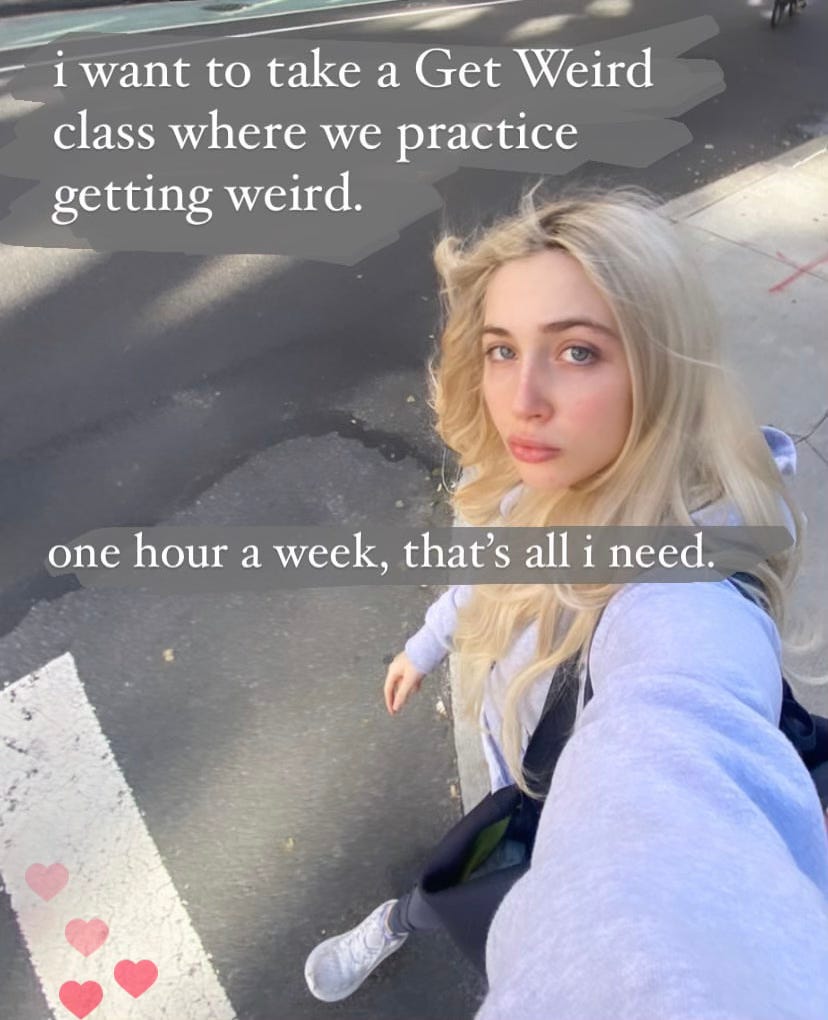
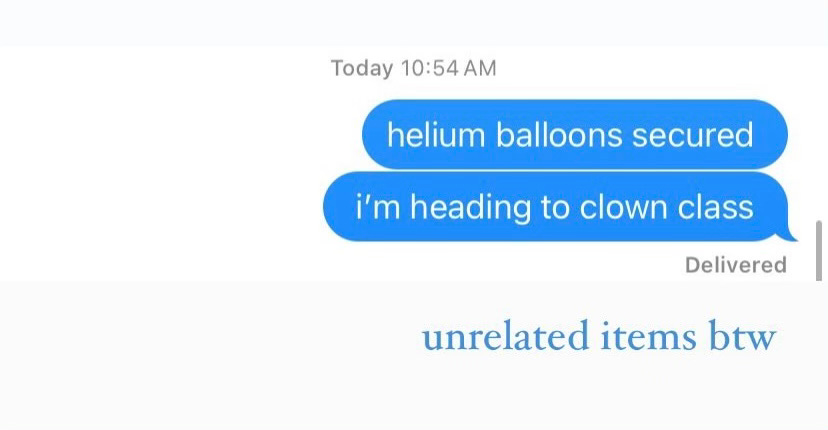


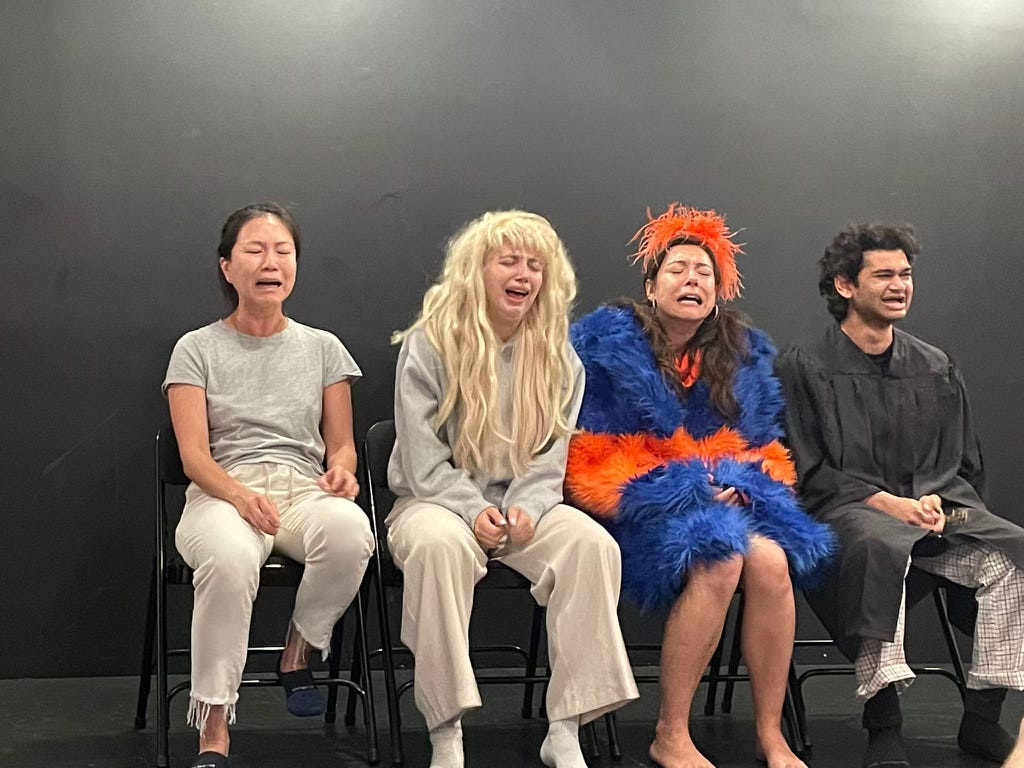
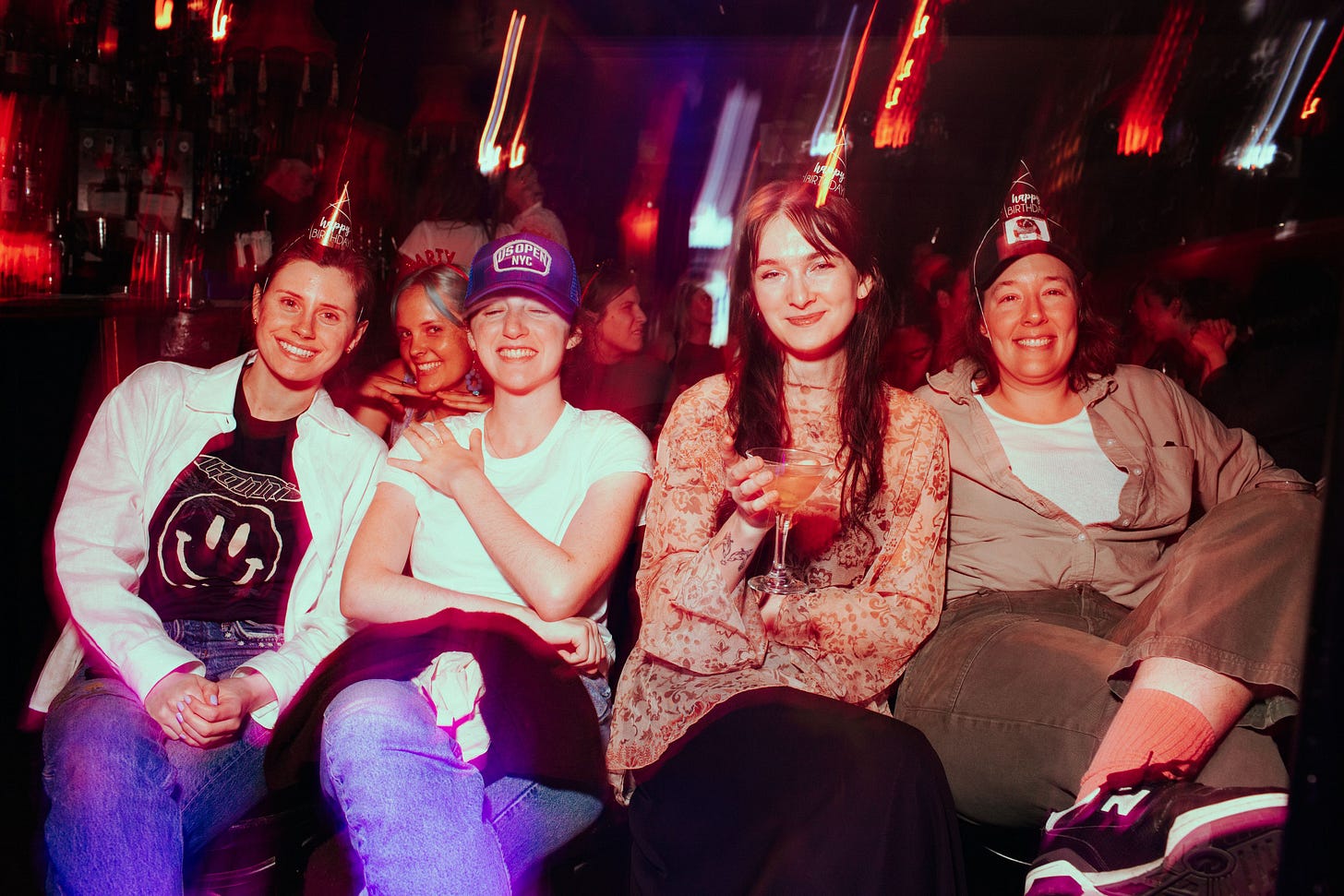
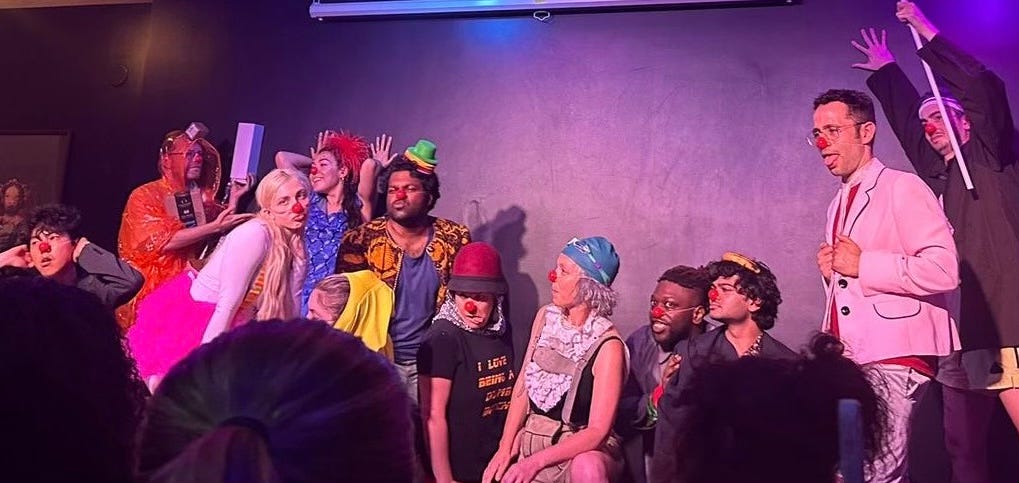
yes, but what about Clown Level 2? how are you progressing toward your Clown doctorate?
loved this!!